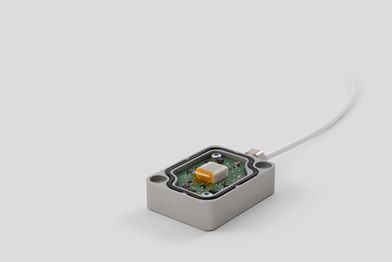Kaufbeuren, 02.09.2020 – The Kaufbeuren-based technology company Sensor-Technik Wiedemann GmbH (STW) presents a revised version of the strain sensor DMS.
The strain sensor DMS for measuring deflections, e.g. of metal arms, has been completely revised and is now available in a new version under the product name SMX.dms-a. The newly developed hardware allows a lower height of the housing. The assembly points are identical to those of the predecessor product, thus enabling the seamless transition in already existing applications. As on the previous strain sensor DMS, both an analog and a digital output are available. Furthermore, the STW toolchain openSYDE is supported, which allows easy integration into already existing systems and is used for the commissioning of intelligent sensors and electronic control units.
The SMX.dms-a strain sensor is suitable for harsh operating conditions, such as those frequently encountered with mobile machines, and now also has an E1 approval for even easier use in vehicles.
Conventional strain sensors are hard to install and put into operation. Due to its optimized connection technology, the installation of the STW sensor can be very well integrated into the production process of e.g. mobile machines. The sensor is intended either for direct mounting or it can be delivered preassembled with an optional carrier plate. openSYDE enables both easy commissioning of the DMS and software updates.
In case of servicing, the sensor can be easily replaced on site. As the configuration data are adopted, the SMX.dms-a sensor can be put into operation without requiring further alignment, meaning that the system is ready for operation again within a very short time.
By measuring deflections, forces, weights or vibrations are recorded indirectly. This can be used in many different application scenarios, such as presses, hoists, containers, steel beams, connecting rods, bridges, silo stands, railroad tracks, wind power plants, tunnel or mining equipment, airport vehicles, cranes and other mobile machines.
STW strain sensors are often used in combination with other STW sensors or control units in the following applications:
- High-resolution measurements of strain or deflection in critical machine structures
- (Indirect) measurement of forces, weights, axel loads or torques
- Load detection, torque limitation and load-dependent stroke limitation in e.g. forklift trucks and cranes
- Vibration damping of crane arms, ladders or other cantilever structures
- Collision detection, e.g. in airport vehicles
The modular sensor system for mobile hydraulics offers various products for the recording of physical variables such as temperature, pressure, strain, inclination and angular velocity, as well as pressure switches also in a functionally safe design. In mobile machines, the measurement values are used, among other things, for monitoring and controlling the drive, the work function or the energy management. They can also be made available with onboard software and cloud solutions. In addition, STW sensors are characterized by exceptional resilience and durability.
The toolchain openSYDE, which STW makes available to its customers as open source, was developed for automation specialists in the field of construction machinery, municipal vehicles, tractors, etc. It is the integrating software with which users carry out the design, development, configuration and service of their application over the entire life cycle.
About STW
As an internationally active company with Headquarter in Kaufbeuren, we stand for the digitalization, automation and electrification of mobile machines for 35 years. With generic or customer-specific products, systems and solutions developed and manufactured at our headquarters in Germany, we support our customers with innovative technology on their way to making their machines the best in the world.
Supplemented by partner products and accompanied by our training, support and system teams, we help medium-sized companies and large OEMs to increase the performance and efficiency of their machines and increase safety. Through communication between machines, connectivity with cloud platforms and additional partner services, we enable the integration of mobile machines into business processes.

![[Translate to Chinese:] [Translate to Chinese:]](/fileadmin/_processed_/f/4/csm_Logo_41f8d03cbf.jpg)